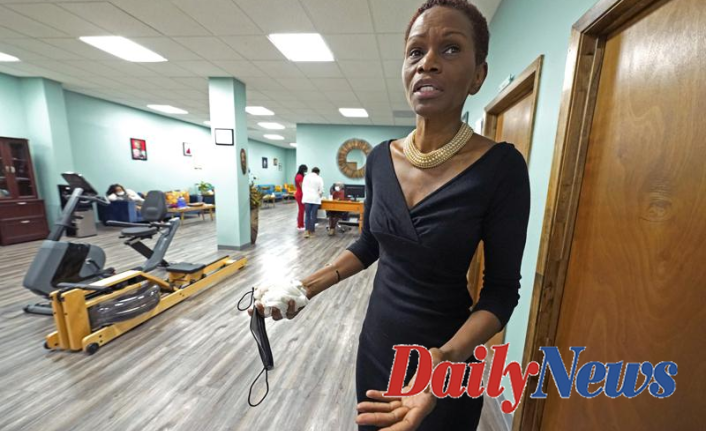According to statistics analyzed and published by The Associated Press, minorities women will be the ones who suffer if the U.S. Supreme Court permits states to restrict or ban abortions.
These numbers are clear. According to the Kaiser Family Foundation which tracks health statistics, Mississippi has 44% population of people of color, but 80% of Mississippi's women have abortions.
They account for 59% of Texas' population and 74% respectively of all those who have had an abortion. In Alabama, the numbers are 35% to 70%. According to the Louisiana Health Department, 42% of Louisiana's population is minorities. About 72% of Louisianans are receiving abortions.
"Abortion restrictions can be racist," stated Cathy Torres (25-year-old organizing manager at Frontera Fund in Texas, which helps women pay for abortions. They directly affect people of color, Black, Brown, Indigenous people, and people trying to make ends meets.
Why are there such large disparities? Laurie Bertram Roberts is the executive director of Yellowhammer Fund in Alabama, which provides financial assistance for women seeking to have an abortion. She said that women of color living in restrictive abortion states often have restricted access to healthcare and limited options for effective birth control. Ineffective or insufficient sex education is a common problem in schools.
Roberts said that if abortions were banned, these same women, often poor, will have difficulty traveling to faraway parts of the country to end pregnancies or raise children. Roberts is Black and used to volunteer at Mississippi's only abortion center.
Roberts stated, "We are talking about people who have been marginalized."
Amanda Furdge (Black) was one of these women. When she discovered she was pregnant, she was a single, unemployed college graduate. She stated that she was unsure how she would be able to afford another child.
She had been to Chicago twice for abortions. Furdge stated that she was able to access an abortion provider without any difficulty. She was now in Mississippi after she moved back from an abusive relationship. She was misled by advertisements and went to a crisis pregnancy centre to try to get out of having an abortion. She was already too advanced to undergo the procedure by the time she reached the abortion clinic.
Furdge, 34, asked Furdge why she couldn't have an abortion easily and safely here. She is happy raising her 7-year old son, but continues to advocate for women being able to choose.
Torres stated that anti-abortion laws were historically written in ways that have hurt low-income women. She cited the Hyde Amendment from 1980, which prohibits federal funds from being used to pay for abortions in any other than rare circumstances.
She also mentioned the 2021 Texas law banning abortions after six weeks of gestation. She said that abortion is illegal in her area, which is near the Rio Grande Valley border with Mexico. Women must travel to get an abortion and must also pass through border patrol checks to reveal their citizenship status.
Torres argued that regardless of what legislators may say, Torres maintained that the intention is to target women who are of color to control their bodies. "They know whom these restrictions will affect. They don't care.
Andy Gipson is a former member and now state agriculture and commerce commissioner. He said that race did not play a role in Mississippi's passage of an anti-abortion law after the 15th of each month. This law is currently before the Supreme Court to challenge Roe v. Wade's 1973 decision that legalized abortion nationwide.
Gipson, a white Baptist minister, stated that he believes all humans are created in God's image and have an "innate worth" that begins at conception. He said that Mississippi legislators tried to protect babies and women by restricting abortion.
Gipson, a Republican, stated that he disagrees with the idea that it is racist or about anything but saving babies' lives. It's about saving the lives of unborn babies and the health and well-being of mothers, no matter their race.
Full coverage: Abortion
People who believe forcing women to have children will cause them hardships are wrong. Lynn Fitch, Mississippi Attorney General, is a white Republican and said that it was easier for working mothers to manage their professional success and family life than it was back in 1949, when Roe was enacted.
Fitch, a divorcee, often speaks out about her own experiences of raising three children while working outside the home. Fitch was raised in a wealthy family and worked as a lawyer -- factors that give working mothers the ability to raise children.
This is not true for all minority women in Mississippi and elsewhere. Advocates claim that in many areas where abortion services have been curtailed, women who are pregnant to term receive little support.
Mississippi is among the most poor states. People working in low-wage occupations often don't have health insurance. While women can sign up for Medicaid while pregnant, coverage ends soon after the birth.
According to the Centers for Disease Control and Prevention, Mississippi has the highest infant death rate in the United States. According to the March of Dimes, Mississippi's infant mortality rate was twice that of white infants in the first year of their lives.












